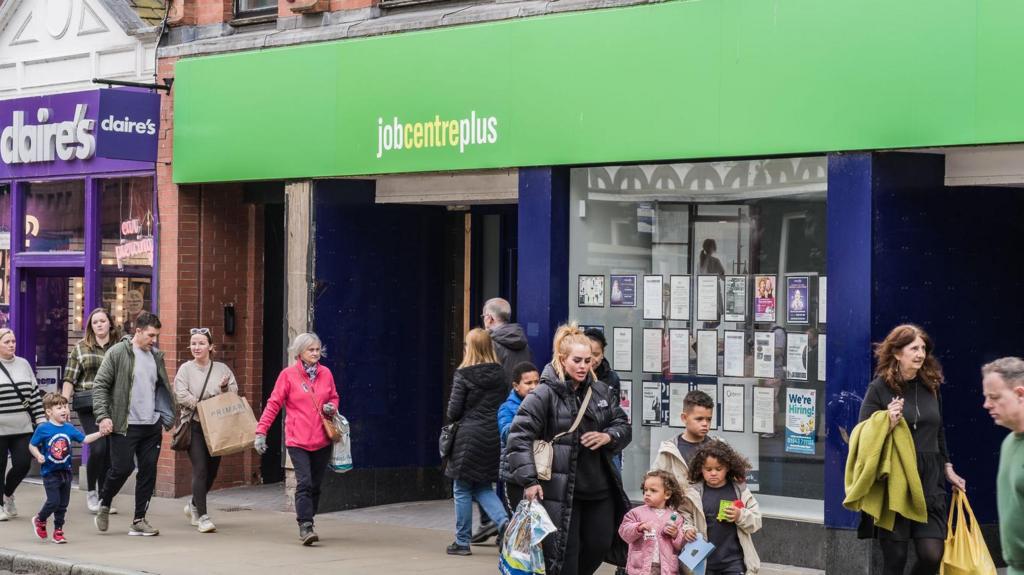Plans to accelerate employment support for individuals impacted by welfare benefit adjustments face significant challenges, with sources telling the BBC the initiative is “undeliverable.”
As part of a policy shift on welfare reforms, the government intends to expedite a £1 billion support program aimed at facilitating employment, originally slated for implementation in 2029.
However, officials within the Department for Work and Pensions (DWP) have characterized the system as “a mess,” citing limited staffing dedicated to the program.
While the DWP did not directly address the officials’ claims, it affirmed having taken “decisive action” and expressed its commitment to “driving up employment and opportunity across the country.”
A primary objective of the government is to increase workforce participation, partly to alleviate the welfare burden and stimulate economic growth, ultimately raising living standards.
Ministers maintain that intensive job support will aid the unemployed, allocating £1 billion to assist those in need.
Nonetheless, a senior benefits official informed the BBC that the government’s program lacks “proper consideration or feasibility.”
“There hasn’t been enough pace or passion to get the thing set up,” the official stated.
The government initially anticipated annual savings of £5 billion by 2030 through its welfare reforms, aiming to curb the growth in benefit claims. Absent any changes, working-age health-related benefits are projected to cost an additional £30 billion by 2029.
However, facing growing opposition from approximately 120 Labour MPs, the government opted to revise its plans.
This reversal ensures that current recipients of the personal independence payment (Pip) and the health component of universal credit will continue to receive their existing benefits.
Instead, planned reductions will only affect future claimants.
As a result of this policy change, the anticipated £5 billion in savings is now estimated to be between £2.5 billion and £3 billion, fueling speculation about potential tax increases in the Autumn Budget, given Chancellor Rachel Reeves had incorporated these cuts into her fiscal planning.
One DWP official told the BBC “there hasn’t been much done” since the government announced its employment support scheme back in March, adding that not enough job coaches were being recruited.
Contracted employment support—in which external companies are hired to help deliver the program—is also reportedly behind schedule, with smaller, less prominent employment schemes understood to have larger teams working on them.
Internal DWP estimates for the number of people who will secure employment are reportedly “very low.”
“They are notoriously difficult people to get into work because in many cases they’ve been out of the job market for a while and employers are not willing to take a chance on them,” said a senior official.
The challenges the government faces are underscored in rural parts of Cumbria. In the Cumberland Council jurisdiction, which encompasses the northern and western regions of the county, 51% of universal credit recipients are not required to seek employment, primarily due to health reasons.
While physical health conditions, such as arthritis and musculoskeletal ailments, are prevalent, recent increases in mental health conditions, including bipolar disorder, anxiety, and depression, have been significant drivers.
Colin Cox, director of public health at Cumberland Council, emphasized the reality of many of these conditions, noting that the suicide rate is significantly higher than the national average.
However, he also contended that some “common experiences” have been over-medicalized.
“The solutions you bring forward for that are very different [than just] prescribing an anti-depressant,” he added.
A government statement asserted that its “once-in-a-generation package of employment support” would “guarantee that disabled people and those with health conditions on out-of-work benefits will be able to access tailored work, health, and skills support, through new and existing programs.”
Even with tailored support, securing employment in certain areas can prove difficult. The BBC examined the government’s job search website for opportunities in three coastal towns in Cumbria—Maryport, Whitehaven, and Workington.
While numerous jobs were listed, over half were in the care sector, limiting options for job seekers. Inadequate public transportation also poses a challenge for individuals residing in rural areas.
Karen Jones, who runs the GoodLives charity in Cleator Moor, which assists approximately 200 people annually, emphasized the importance of “confidence” when seeking employment.
“Getting them into employment can be difficult and once they’ve got a job, we maintain contact for up to six months.
“If you’ve never worked before, it’s a very vulnerable time when you get your first job and it can be the difference between success and failure.”
Kerry Ritson, supported by GoodLives, works eight hours a week in the charity’s shop.
Diagnosed with ADHD and raising two children with behavioral challenges, she had spent years hesitant to engage with the outside world.
She said if she had not taken the chance of the job, “I wouldn’t be feeling confident in myself, I wouldn’t have made friends for life”.
“I looked as though I was doing ok, but I mask and I just wasn’t me. I’m starting to learn how to be me,” she added.
Individuals reliant on government benefits explain the critical role they play in their lives.
Joanne Sansome, a wheelchair user in assisted living, described Labour’s plans as a “smokescreen.”
Some measures within the Employment Rights Bill are not scheduled to take effect until 2027.
Ministers are urgently seeking to persuade Labour MPs to support benefit cuts in a vote this evening.
Charlie Lincoln believes cuts to Pip payments would be “dangerous and unacceptable.”

